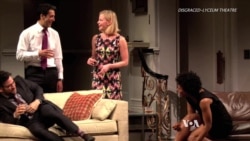A disastrous dinner party for four — an irreligious Muslim, a white female defender of Islam, an African-American woman and her Jewish husband — is the central event in “Disgraced,” now playing on Broadway.
Amir, an ambitious Pakistani-American mergers-and-acquisitions lawyer, and his wife, Emily, a painter, are entertaining Amir’s colleague, Jory, and her husband, Isaac, a curator. The four begin arguing, with increasing heat, about Islam, the 9/11 attacks, racial profiling and female veiling.
And then things get really ugly. Amir, it emerges, has tried to hide his Muslim background from his law firm superiors, using the surname Kapoor, rather than his actual birth name, Abdullah. They have become suspicious of him, especially after learning that he appeared in court on behalf of a local imam accused of raising money for Hamas.
“It’s a complicated play, it’s a disturbing play,” says Pakistani-American writer Ayad Akhtar of his play, which won the 2013 Pulitzer Prize for drama. He added, “I don’t think that anybody walks away feeling like they understood what they saw, and I think that’s partly by design. I wish the audience to continue to think about the play when they leave, and I don’t want it to be reduced to a sentence.”
As a novelist and playwright, Akhtar, 44, has often focused on the fraught relationship between Islam and the West. An earlier play, “The Invisible Hand,” is a drama about a former investment banker who must contrive to win his own release after he is kidnapped for ransom in Pakistan by Islamic militants.
"American Dervish," Akhtar’s first novel, tells the story of a boyhood like his own, growing up the son of secular Muslim Pakistani immigrants in Milwaukee, Wisconsin, in the American Midwest. “I had a great experience growing up in Wisconsin,” Akhtar said. He was aware of being different from his Catholic and Protestant friends, “because of the kinds of things that happened in my house, the foods we ate, and the kinds of folks [who] came from different parts of the world to visit my family. But I never felt excluded."
That changed after the 9/11 attacks, he said.
“It became nasty. It’s a nasty environment," he said. "I don’t spend my time bemoaning that because, as an artist, that situation is no less interesting, frankly, and no less universal and emblematic of certain fundamental human themes in historical experiences that so many communities have had. So, writing about it is an interesting thing, but it’s not an easy time to be Muslim.”
Amir in “Disgraced” would agree. A Muslim apostate who loathes the religion, he nonetheless confesses to feeling “just a little bit of pride” when he sees “folks in the Middle East dying for values you were taught were purer.” Even when the Twin Towers fell, he reluctantly admits, he felt a tinge of that tribal feeling again “that we were winning.”
It’s a shocking moment in the play, but one that Akhtar believes is intrinsically human.
“We all have them,” he said. “Studies show that tribalism [emerges] as soon as infants begin to have cognition. They begin to identify themselves with a group in opposition to others. It’s just a deep part of our cognitive function, and something we need to be aware of if we’re going to stand any chance of being able to deal with it productively, to understand that we are all part of the same struggle of being human."
Unlike his parents, Akhtar said, he was devout as a child, and “fascinated” by the character of the Prophet Muhammad. Today, he said, he considers himself “deeply religious,” but without a denomination or creed. “I think they are all deeply inspiring and deeply flawed systems, but they are the best we’ve got when it comes to trying to understand the great mystery of human life,” he said.
The current production of “Disgraced,” directed by Kimberly Senior at the Lyceum Theatre, stars Hari Dhillon, Gretchen Mol, Danny Ashok, Karen Pittman and Josh Radnor. It closes March 1st, prior to a national tour later this year.





